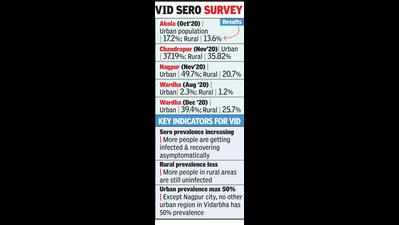- News
- City News
- nagpur News
- Wardha’s second sero survey shows near 30% prevalence of Covid-19
Trending
This story is from February 7, 2021
Wardha’s second sero survey shows near 30% prevalence of Covid-19

Nagpur: A fresh sero-survey for Covid-19 prevalence conducted in Wardha district has reported nearly 30% prevalence of Covid-19 in the district. This includes 39% in urban areas and nearly 26% in rural parts which means, 39% urban population in Wardha district already has Covid-19 antibodies.
The survey was conducted by district health department with technical assistance from the Mahatma Gandhi Institute of Medical Sciences (MGIMS) in Sevagram.This is the most recent sero survey of Vidarbha as all earlier surveys were conducted between August and November 2020. This was the second survey in Wardha district, with first conducted in August 2020. With this, Wardha has become only district in Vidarbha to conduct two surveys and present comparative data of the sero prevalence of Covid-19.
Dr Nitin Gangane, dean of the MGIMS told TOI that blood samples of 3,063 citizens of Wardha district were tested for Covid-19 antibodies during this survey. “In August, the overall sero prevalence in Wardha district was 1.5% which increased up to 30% in December 2020. This means, Covid-19 infection spread up to 20 times in 4 months,” Dr Gangane said.
In Vidarbha, sero surveys have been conducted only in Nagpur, Wardha, Chandrapur and Akola districts. Out of them, only Wardha has comparative figures as no other district conducted second survey.
Analysis of the available figures shows that Vidarbha’s rural population is still at risk and people need to be careful. No survey in Vidarbha has seen more than 40% prevalence in rural population. Even in urban population, only Nagpur city has shown about 50% prevalence and some parts of Nagpur have seen up to 75% prevalence of Covid-19. Experts have said that people must continue to follow Covid restrictions or the virus will continue to infect people for long time.
“Even at national level, the overall figure of seropositivity in India is 21.7%. This clearly shows that a large population is still uninfected in India. Unfortunately, a majority of people in both urban and rural areas are becoming casual about Covid-19 thinking that we will develop herd immunity,” said Dr Nitin Thatte, epidemiologist from Akola adding that herd immunity is not an option for India.
“Responsible behaviour and vaccination whenever your turn comes is the best way to get protected,” he said.
The survey was conducted by district health department with technical assistance from the Mahatma Gandhi Institute of Medical Sciences (MGIMS) in Sevagram.This is the most recent sero survey of Vidarbha as all earlier surveys were conducted between August and November 2020. This was the second survey in Wardha district, with first conducted in August 2020. With this, Wardha has become only district in Vidarbha to conduct two surveys and present comparative data of the sero prevalence of Covid-19.
Dr Nitin Gangane, dean of the MGIMS told TOI that blood samples of 3,063 citizens of Wardha district were tested for Covid-19 antibodies during this survey. “In August, the overall sero prevalence in Wardha district was 1.5% which increased up to 30% in December 2020. This means, Covid-19 infection spread up to 20 times in 4 months,” Dr Gangane said.
In Vidarbha, sero surveys have been conducted only in Nagpur, Wardha, Chandrapur and Akola districts. Out of them, only Wardha has comparative figures as no other district conducted second survey.
On February 5, ICMR released outcomes of the third national sero survey, but no district in Vidarbha was included in this survey. Even Maharashtra state hasn’t conducted any statewide survey so far. As a result, the figures available about the Covid-19 sero prevalence are very limited in Vidarbha.
Analysis of the available figures shows that Vidarbha’s rural population is still at risk and people need to be careful. No survey in Vidarbha has seen more than 40% prevalence in rural population. Even in urban population, only Nagpur city has shown about 50% prevalence and some parts of Nagpur have seen up to 75% prevalence of Covid-19. Experts have said that people must continue to follow Covid restrictions or the virus will continue to infect people for long time.
“Even at national level, the overall figure of seropositivity in India is 21.7%. This clearly shows that a large population is still uninfected in India. Unfortunately, a majority of people in both urban and rural areas are becoming casual about Covid-19 thinking that we will develop herd immunity,” said Dr Nitin Thatte, epidemiologist from Akola adding that herd immunity is not an option for India.
“Responsible behaviour and vaccination whenever your turn comes is the best way to get protected,” he said.
End of Article
FOLLOW US ON SOCIAL MEDIA











